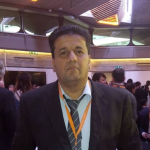Access to knowledge should be universal: an interview with AAS Affiliate Professor Sameer Jaffer Hameer
| 22 October, 2019 | Developers f1000 |

Image credit: sakkmesterke

As part of our Open Access Week campaign, we spoke with Professor Sameer Jaffer Hameer from the Technical University of Kenya, School of Aerospace and Aviation Engineering and School of Electrical and Electronic Engineering.
Prof Hameer shared his experiences with accessing research and teaching materials, as well as his thoughts on the future of publishing on the African continent.
Please tell us a little about your background and current work
I’m currently Professor in Aerospace and Electrical Engineering at the Technical University of Kenya. I wear two hats in the disciplines of aerospace and electrical with interests ranging from the design of wind turbines for energy to drones for wildlife poaching. I also teach courses in fluid dynamics and thermodynamics among others. As for my background, I have a PhD in Aerospace Engineering, a Masters in Aerospace and a BSc in Electric Engineering from Georgia Institute of Technology (AT, USA). I completed my postdoctoral work in South Africa in 2013–2015 working on solar water heaters.
How easy do you find it to access research literature?
I am able to access papers through agreements currently in place. Some of these are direct with publishers such as Wiley or through services such as Science Direct. I use these services a lot when writing literature reviews and am limited to these and others which provide access to their content. Overall, I would say quite a significant portion of my literature review is based on open access material.
How do you see open access as beneficial for African researchers?
The impact of open access on Africa has been immense.
Financial considerations are always a major factor in north–south linkages but I think it is particularly pronounced in this corner of Africa where researchers are constrained in obtaining material and may be forced to pay. Open access has definitely improved access to literature for African researchers.
I remember in 2013 while at Nelson Mandela in Arusha (Tanzania), we had to write a petition to the Institute of Electrical and Electronics Engineers because at that time they had no open access titles and we were unable to read their content, which are benchmark publications in our field.
There has also been an impact on teaching. Back when I was a student in the US, I would go to the textbook centre when the Professor had assigned a book and it would be available to buy. Today, at our universities we do not have those kinds of facilities, we just have those books in the library. I now use eBooks as teaching reference material which has helped overcome this challenge.
More than anything, open access has raised the question; why should people pay for knowledge, access to knowledge should be universal.
Do you see any limitations to current open access models for African researchers?
The increase in open access journals has also seen an increase in predatory publishers which particularly target African student researchers. These publications lack quality control and bring questions over their scientific authenticity, as well as taking money from researchers.
Another challenge when writing literature reviews is that you might be limited in only including references to open access papers. You might need a very recent paper and not be able to find a copy without payment. However, there are now incentives looking to address this. Similarly, with eBooks we may not be able to access the latest version but instead must use an older edition.
How well do you think global conversations around open access consider the needs of African researchers?
I believe current large publishing houses have their own limitations.
There are alternative good examples, such as Capetown University, which has its own publications housed at the university. The African Academy of Science’s (AAS) own publishing platform, AAS Open Research, is a very good option for me allowing publication at no cost due to my status as an Affiliate of the AAS. Going further than this, having an all-Africa platform will be very important to expand the scope of this publication to encompass engineering and other disciplines.
How would you like to see open access in Africa progress in the next 5–10 years?
The best way forwards, in my opinion, is to start with these local publishing initiatives. We should encourage the development of local journals based at universities, making publications more accessible starting with grass-roots initiatives.
We should also be building experienced reviewer pools within African institutions to build the reputation of our publications and researchers.